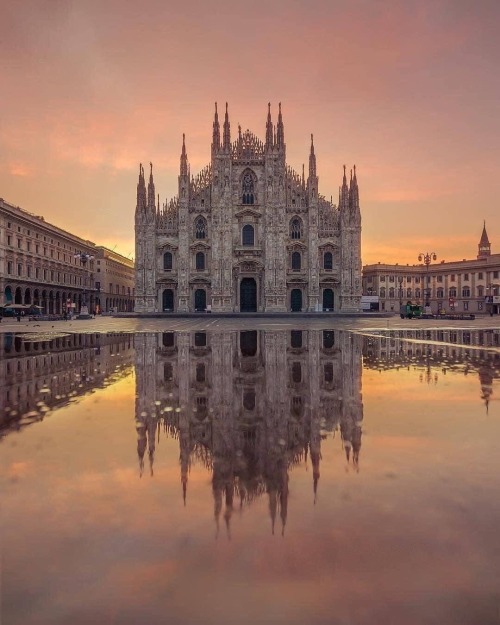Theinfinityarchivist - The ♾️ Archivist

More Posts from Theinfinityarchivist and Others
my gf's laptop's audio driver's broke and she's complaining about it being slow so now i get to install linux on it :3


Milan Cathedral, Italy 🇮🇹

This poem by the Persian Sufi Poet Abū Saʿīd Abū'l-Khayr or Abusa'id Abolkhayr
(Persian: ابوسعید ابوالخیر) (December 7, 967 - January 12, 1049)
is inscribed on the tomb of Jalāl al-Dīn Muḥammad Rūmī
and is often incorrectly attributed to him.
باز آ باز آ، هر آن چه هستی باز آ
گر کافر و گبر و بتپرستی باز آ
این درگهِ ما، درگهِ نومیدی نیست
صد بار اگر توبه شکستی باز آ
___________
Transliteration:
bāz ā bāz ā, har ān keh hastee bāz ā
gar kāfer o gabr o bot parastee bāz ā
een dargeh-ye mā, dargeh-ye nomeedee neest
sad bār agar tobeh shekastee bāz-ā
___________
I provide three translations. The first, by Barks, is the most famous rendering into English. Barks captures the simplicity of the sentiment. Gamart more accurately translates the verse. My own version is meant to be literal, rather than poetic. None of the English translations capture the repugnance that the words infidel, heretic, pagan, unbeliever or idolater carry in the original. Please read the note for further insight into this poem.
___________
Translation by Coleman Barks:
Come, come, whoever you are.
Wanderer, worshiper, lover of leaving. It doesn't matter.
Ours is not a caravan of despair.
Come, even if you have broken your vows a thousand times. Come, yet again, come, come.
___________
Translation by Sidi Ibrahim Gamart:
Come again, please, come again, Whoever you are. Religious, infidel, heretic or pagan. Even if you promised a hundred times And a hundred times you broke your promise, This door is not the door Of hopelessness and frustration. This door is open for everybody. Come, come as you are.
___________
My own more literal translation:
Come, come, whoever you are, come again
Be you faithless, unbeliever or idolater, come again
This doorway of ours, it is not the entry to despair
If you’ve broken your repentance a hundred times, come again.
___________
Notes:
bāz ā = come again; welcome (bāz means both “again” and “open”; both meanings are relevant here)
kāfer = usually translated as infidel, the basic meaning of the word in Arabic (kufr) is someone who is ungrateful [for God’s blessings], or who has no faith; by extension, someone who does not believe in the tenants of Islam, who is a pagan, non-believer, or member of a non-Muslim religion. It is commonly used as a pejorative term.
gebr or gabr = the word originally referred to someone who was a Zoroastrian but came to have a pejorative meaning referring to any non-Muslim, or sometimes to any unbeliever The word continues to be used as a slur against Christians in some former areas of the Ottoman Empire.
Bot parasti = idol worshiper (again, a pejorative term)
All three of the phrases used have the sting of extremely insulting, pejorative terms. All three place the person being referred to as the most outcast or outside categories in Islamic society. To say they are welcome is to go against all expectations.
* Note that the word Dargah has many meanings, several of which are indicated directly in this line: portal, door, threshold, the site of the saint’s tomb. The royal court (dargah) was also where the king dispensed legal rulings and justice, which also plays into the poem: no matter how many transgressions you have made, this is not the place for having no hope. Baz A, means, come, come again, welcome.
* درگاه (درگهِ) dargāh (dar=door; gāh or gah=place): Portal, door; location of the door [into a house or building]; threshold; a royal court, a palace; a mosque; shrine or tomb (of some reputed saint}; place of pilgrimage.
** nomidi: no hope (na=no; omid=hope)
tobeh (Arabic “tawbeh”) = repentance. In Islam repentance is an individual matter between an individual and the Divine. By using this word the poet transfers the point of view from society’s vantage point (someone who is outside the fold of society), to the personal (what is my relationship to the Divine).
Persian (Farsi) Calligraphy by S J Thomas www.palmstone.com

loputyn
it wild to me that there are people out there who aren't interested in history
like wdym you don't think about the fact that women would tell stories as they made butter in the same way we listen to podcasts today? wdym you don't think about that one Chinese poet who wrote about how much he loved his cats hundreds of years ago? wdym you don't think about the fact that we found a gravesite of a young child surrounded by flowers from THOUSANDS of years ago? wdym you don't think about how people wrote "i was here" into the walls in Pompeii? wdym you don't think about the little egyptian boy who drew little doodles at the top of his school works more then a thousand years ago?
wdym you don't think about the fact that people, no matter the place, time, social status, are fundamentally no different from you. that they loved the same as you, enjoyed the same things you did, dreamed about a better life the same way you did. that despite how seemingly detached you are from these people, in time, place, and culture, the things you do and the thing u are, are so undeniably human that it transcends time and space

Penguin beach. Elementary Science Readers: First Book. 1927.
Internet Archive

Kiel, Germany 1920s
I'm finally installing Linux on my PC
I'm so fucking sick of windows and Microsoft. The fucking nerve to show me ads on my lock screen and my start menu. I'm sick of it and I want open source shit now

-
 arteway reblogged this · 3 weeks ago
arteway reblogged this · 3 weeks ago -
 dannyevans99 liked this · 3 weeks ago
dannyevans99 liked this · 3 weeks ago -
 jett-blck liked this · 3 weeks ago
jett-blck liked this · 3 weeks ago -
 awwkie liked this · 3 weeks ago
awwkie liked this · 3 weeks ago -
 studiousstoner reblogged this · 3 weeks ago
studiousstoner reblogged this · 3 weeks ago -
 lovecraftiancowboy reblogged this · 3 weeks ago
lovecraftiancowboy reblogged this · 3 weeks ago -
 lovecraftiancowboy liked this · 3 weeks ago
lovecraftiancowboy liked this · 3 weeks ago -
 jackal00ps liked this · 3 weeks ago
jackal00ps liked this · 3 weeks ago -
 babinea liked this · 3 weeks ago
babinea liked this · 3 weeks ago -
 sun-on-the-ceiling liked this · 3 weeks ago
sun-on-the-ceiling liked this · 3 weeks ago -
 transistor-rhythm-909 reblogged this · 3 weeks ago
transistor-rhythm-909 reblogged this · 3 weeks ago -
 dragonunavailable reblogged this · 3 weeks ago
dragonunavailable reblogged this · 3 weeks ago -
 dragonunavailable liked this · 3 weeks ago
dragonunavailable liked this · 3 weeks ago -
 artisticmaturesexy liked this · 3 weeks ago
artisticmaturesexy liked this · 3 weeks ago -
 peaceispriceless1 liked this · 3 weeks ago
peaceispriceless1 liked this · 3 weeks ago -
 lionkio liked this · 3 weeks ago
lionkio liked this · 3 weeks ago -
 nekoshogun4 liked this · 3 weeks ago
nekoshogun4 liked this · 3 weeks ago -
 mobius1s reblogged this · 3 weeks ago
mobius1s reblogged this · 3 weeks ago -
 hyacinthbloomz reblogged this · 3 weeks ago
hyacinthbloomz reblogged this · 3 weeks ago -
 eldandy82 liked this · 3 weeks ago
eldandy82 liked this · 3 weeks ago -
 mediaheart liked this · 3 weeks ago
mediaheart liked this · 3 weeks ago -
 sashawebscape liked this · 3 weeks ago
sashawebscape liked this · 3 weeks ago -
 bob-lazars-honda liked this · 3 weeks ago
bob-lazars-honda liked this · 3 weeks ago -
 toomuchgas10 reblogged this · 3 weeks ago
toomuchgas10 reblogged this · 3 weeks ago -
 mondaymilk liked this · 3 weeks ago
mondaymilk liked this · 3 weeks ago -
 fckinhellbro reblogged this · 3 weeks ago
fckinhellbro reblogged this · 3 weeks ago -
 fckinhellbro liked this · 3 weeks ago
fckinhellbro liked this · 3 weeks ago -
 unabombs liked this · 3 weeks ago
unabombs liked this · 3 weeks ago -
 buttonpressingloverboy reblogged this · 3 weeks ago
buttonpressingloverboy reblogged this · 3 weeks ago -
 esynk liked this · 3 weeks ago
esynk liked this · 3 weeks ago -
 classyrebellady liked this · 3 weeks ago
classyrebellady liked this · 3 weeks ago -
 shtl liked this · 3 weeks ago
shtl liked this · 3 weeks ago -
 santifergon reblogged this · 3 weeks ago
santifergon reblogged this · 3 weeks ago -
 feralfens reblogged this · 3 weeks ago
feralfens reblogged this · 3 weeks ago -
 feralfens liked this · 3 weeks ago
feralfens liked this · 3 weeks ago -
 hello-world-im-snow liked this · 3 weeks ago
hello-world-im-snow liked this · 3 weeks ago -
 b1tterbiscuit7 liked this · 3 weeks ago
b1tterbiscuit7 liked this · 3 weeks ago -
 eventualityofananomaly reblogged this · 3 weeks ago
eventualityofananomaly reblogged this · 3 weeks ago -
 ghostieking reblogged this · 3 weeks ago
ghostieking reblogged this · 3 weeks ago -
 wingchunwaterbender liked this · 3 weeks ago
wingchunwaterbender liked this · 3 weeks ago -
 sombrattire liked this · 3 weeks ago
sombrattire liked this · 3 weeks ago -
 unexistance liked this · 3 weeks ago
unexistance liked this · 3 weeks ago -
 leucoma liked this · 3 weeks ago
leucoma liked this · 3 weeks ago -
 silentglory22 liked this · 3 weeks ago
silentglory22 liked this · 3 weeks ago -
 urfavrib liked this · 3 weeks ago
urfavrib liked this · 3 weeks ago -
 crunchity-munchity liked this · 3 weeks ago
crunchity-munchity liked this · 3 weeks ago -
 enderllama liked this · 3 weeks ago
enderllama liked this · 3 weeks ago -
 maddogmp3 liked this · 3 weeks ago
maddogmp3 liked this · 3 weeks ago -
 pffndr liked this · 3 weeks ago
pffndr liked this · 3 weeks ago
